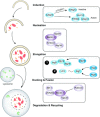Plant lectins, from ancient sugar-binding proteins to emerging anti-cancer drugs in apoptosis and autophagy
- PMID: 25488051
- PMCID: PMC6496769
- DOI: 10.1111/cpr.12155
Plant lectins, from ancient sugar-binding proteins to emerging anti-cancer drugs in apoptosis and autophagy
Abstract
Ubiquitously distributed in different plant species, plant lectins are highly diverse carbohydrate-binding proteins of non-immune origin. They have interesting pharmacological activities and currently are of great interest to thousands of people working on biomedical research in cancer-related problems. It has been widely accepted that plant lectins affect both apoptosis and autophagy by modulating representative signalling pathways involved in Bcl-2 family, caspase family, p53, PI3K/Akt, ERK, BNIP3, Ras-Raf and ATG families, in cancer. Plant lectins may have a role as potential new anti-tumour agents in cancer drug discovery. Thus, here we summarize these findings on pathway- involved plant lectins, to provide a comprehensive perspective for further elucidating their potential role as novel anti-cancer drugs, with respect to both apoptosis and autophagy in cancer pathogenesis, and future therapy.
© 2014 John Wiley & Sons Ltd.
Figures
References
-
- Van Damme EJ, Lannoo N, Fouquaert E, Peumans WJ (2004) The identification of inducible cytoplasmic/nuclear carbohydrate‐binding proteins urges to develop novel concepts about the role of plant lectins. Glycoconj. J. 20, 449–460. - PubMed
-
- Liu B, Bian HJ, Bao JK (2010) Plant lectins: potential antineoplastic drugs from bench to clinic. Cancer Lett. 287, 1–12. - PubMed
-
- Mody R, Joshi S, Chaney W (1995) Use of lectins as diagnostic and therapeutic tools for cancer. J. Pharmacol. Toxicol. Methods 33, 1–10. - PubMed
Publication types
MeSH terms
Substances
LinkOut - more resources
Full Text Sources
Other Literature Sources
Research Materials
Miscellaneous






